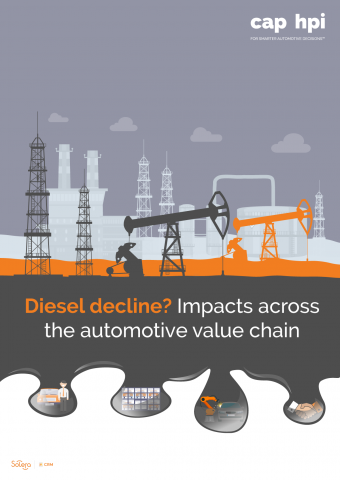Diesel decline? Impacts across the automotive value chain.
This report analyses the key factors driving the decline in demand for diesel vehicles in the new and used markets. It will examine the consequent impact on residual values and consider how this will influence stakeholders in the European vehicle industry and market.
Pages: 65 Released: 20 Nov 2017 £1995.00

Diesel decline? Impacts across the automotive value chain
Features:
- Provides a high level of detail and depth of data
- Will support future decisions and risk assessment associated with diesel vehicles on an operational and strategic level
- An analytical paper that provides evidence towards situational analysis, reflections on how diesel decline will impact individual markets, sector and countries.
- Contains residual values data for diesel vehicles for various European countries
- Check the latest owner details against the relevant VRM
Introduction:
In many European markets, diesel passenger cars have become the default choice for many drivers. Offering a winning combination of lower running costs through greater fuel efficiency, and improved environmental performance thanks to lower CO2 emissions, governments have encouraged consumers to switch from petrol to diesel. OEMs have responded with diesel models that now match petrol vehicles for refinement and ‘drivability’.
However, it is important to remember that this is a relatively new phenomenon. As recently as the late 1990s, diesel passenger cars accounted for less than a quarter of West Europe’s new car sales but this has risen rapidly – peaking at 55.7% in 2011.
Three key factors are responsible for this growth:
1. Pressure from governments to push consumers towards diesel. This is frequently done via taxation systems, rewarding consumers through lower taxes on fuel or lower circulation taxes, for selecting a diesel vehicle.
2. Improvements in diesel technology, making diesel-engined vehicles quieter, more refined, more pleasant to drive than older diesel vehicles. This has extended to creating ‘performance diesels’. This has allowed diesel engines to be installed in a wider range of vehicles, such as sports cars and convertibles.
3. The popularity of certain vehicle-types, specifically the MPV (multi-purpose vehicle or minivan) segment (1990s-early 2000s) and more recently the SUV (sport utility vehicle) segment, where size and weight have driven consumers towards diesel variants. For example, between 1990 and 2016, SUV market share grew from 2.6% to 14%, with SUVs accounting for over 20% of
the market in five of the 18 markets in 20161.
Looking at Europe’s four largest volume markets, we see some dramatic shifts in demand between 1990 and the diesel peak year of 2011:
• Germany diesel share rose from 10% to 48%,
• France diesel share, already West Europe’s highest at 33%, rose to 72%,
• Italy diesel share rose from 7% to 55%,
• The UK, diesel share rose from 6% to 51%.
Since 2011, there has been a noticeable decline in diesel passenger car new registrations in France, Germany and the UK (but not Italy). An increasing amount of research is calling into question diesel’s environmental benefits, and we are seeing local, national and international authorities rethinking their attitudes. Consequently, consumers have become concerned that their choice may have been the wrong one, and what they assumed was a sound decision both financially and environmentally might be a financial liability, and undermining the health of fellow citizens.
This report seeks to understand the impact these changing attitudes will have on the major European markets, and will explore the following issues:
What is the outlook for the market for diesel vehicles in the big-4 European markets?
How rapidly will diesel decline in terms of new market share and used vehicle values?
What are the barriers to exit which will support diesel RVs and how quickly will they be overcome?
How will this impact key participants in the diesel vehicle marketplace (OEMs, suppliers, fleets, dealers, private buyers (new), used traders, used buyers)?
Contributors:
Matthew Freeman, cap hpi Managing Consulting
Dylan Setterfield, cap hpi International Senior Editor Forecast Car Values
Guillaume Heron, cap hpi France Forecasting Editor
Patrick Mayerhörmann, cap hpi Used Car Editor Germany
Bernhard Applehoff, cap hpi Head of Data Governance
Andrew Mee, cap hpi Senior Forecasting Editor Cars UK
Derren Martin, cap hpi International Senior Editor Current Car Values
James Dower, cap hpi Senior Editor – Cars
Toufik Aboussalama, cap hpi Car Editor – France
What's Inside
- Invaluable insight for shareholders and senior management to make informed business choices for the short, mid and long term.
- Analysis from within country editors in the EU to reflect on the situational analysis, what it means for the automotive industry, how it will affect diesel values across different countries and sectors
- Provides a high level of detail and depth of data
- Will support future decisions and risk assessment associated with diesel vehicles on an operational and strategic level
- An analytical paper that provides evidence towards situational analysis, reflections on how diesel decline will impact individual markets, sector and countries.
- Contains residual values data for various European countries
Contents
- Review of the current diesel vehicle marketplace
- Recent performance of diesel vehicles’ residual values in multiple markets
- Future actions, known and expected, and how that is likely to impact on residual values
- Residual value scenarios across multiple markets
- The outlook of diesel vehicles in the European markets
- The impact for key participants in the diesel vehicle marketplace
Audience
1. OEMs
2. Automotive suppliers
3. Retailers
4. Fleet
5. Contract Hire and Leasing
6. Private buyer
Payment & delivery information
Please complete all the information required to ensure the report is delivered to the correct person and address. A secure online payment will be taken before release of the report.
If you have any queries regarding purchasing this report, please contact us here
For Terms and Conditions click here

